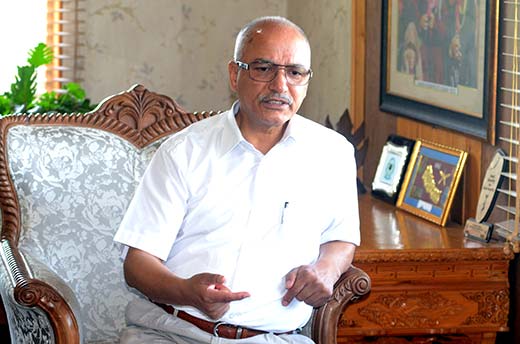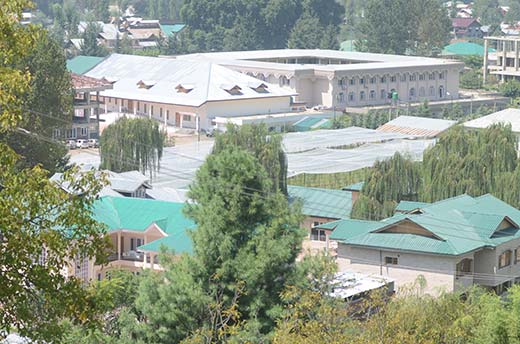Faculties at SKUAST-K are up in arms against the incumbent Vice-Chancellor, who even after completing his tenure of five years seems unmoved. With the impasse over the proposed move of certain divisions to Wadora seemingly deepening, Syed Asma reports the raging controversy
Sher-e-Kashmir University of Agricultural of Sciences and Technology – Kashmir (SKUAST-K), a leading institution for promoting agricultural research and creation of human resource to cater to the needs of the farmers has lately seen some hiccups in its functioning.
Though, being one of the oldest institutions in whole of North India, infrastructural deficit has over the years severely mired its developmental avenues.
The first campus of SKUAST emerged in Wadora, Sopore in 1960 as an agriculture College primarily for producing agricultural graduates. In 1982, the state legislature through an act upgraded it to a university with its headquarters at Shalimar campus. With the establishment of campus at Shalimar, “entire attention was transferred to the new campus and thus Wadora got neglected,” opines an old faculty member of the varsity. The campus at Wadora remained restricted to the undergraduate courses only.
In the last fifty years nothing much was put in place at Wadora and it still gives an archaic look. “The campus lacks basic research facilities even for undergraduate students, not to talk of advanced research,” said a lab attendant.
Lately a group of master’s students at the campus required an autoclave – basic lab equipment, and interestingly, they were given a kitchen pressure cooker! “Can you imagine? This is the infrastructure we are studying in. What do you expect us to learn,” says an undergraduate student with a satirical smile.
But now the university administration for past few years is trying to change the set-up and improve the infrastructure, claims Dr Tej Pratap, the Vice Chancellor of the University.
Dr Pratap has completed his five year tenure in June, 2015 and a search committee constituted has recommended names of eligible candidates for the post of Vice-Chancellor and Dr Pratap is one of them.
However, the faculty of several divisions of the institution rubbished VC’s claims and alleged that Prof Pratap has brought in disrepute to the institution. The professors further claimed that Prof Pratap has managed his appointment in the institution in the first place and is again lobbying hard for the second term.
“Even after completing his tenure of five years, Prof Pratap is still enjoying his office and nobody in the authorities show any concern,” said the professors, wishing not to be named.
“Moreover,” the group adds, “rules were flouted during the appointment of Prof Pratap as VC who has received an honorary professorship in Tibet, while as the persons eligible for the post should have served as professor for ten years.”

The proposed move of Prof Pratab to shift the departments of Agronomy and, Plant Breeding and Genetics to Wadora has been halted by a status quo order by the High Court, under a writ petition filed by some professors.
In spite of the directions from state High Court on any shifting, Dr Pratap has asked the entire faculty of Agriculture to shift to the campus of Wadora, alleged the faculty members.
It includes the Masters and PhD courses registered in the division of Agronomy and Plant Breeding and Genetics. Its undergraduate course already exists there.
The masters and Phd students of Agronomy and Plant Breeding and Genetics claimed that “they are pursuing their courses smoothly and conveniently at Shalimar campus and there is no sense in shifting them to a place that is not more than a primary school.”
Dr Pratap before joining SKUAST – K has been VC for two terms at a university in Palampur, Himachal Pradesh.
“I am not an academician; I am an expert in capacity building. Some of my friends found me fit for the post of a VC in these universities and I found it interesting,” Dr Pratap says with a smile. “So, I am here.”
Dr Pratap is academically an ecologist. He has done his PhD in ecology and for 13 years has worked in an international centre for development of mountain areas as mountain agriculture development expert. The centre is based in Kathmandu, Nepal. “We in the centre were supposed to work in several countries on international development projects and policy research. My major work is in China, I have worked in Pakistan, Bhutan, Nepal, Chittagong Hill Tracts and Myanmar,” says Dr Pratap.
As Dr Pratap started talking about his work in the mountainous areas across globe, it was difficult to stop him. “I for ten years studied China and learnt different programs and technologies that are in vogue there,” Dr Pratap says.
Dr Pratap may not have been a professor for ten years, as is required by the post of a Vice Chancellor, but he has a rich resume` to be an administrator, believes his fans in the campus.
In the last five years, Prof Pratap claims to have put in place many measures for the development of the institution. In the first place, the ICAR noted that 35 percent of the faculty members were non-PhD, which was “hampering the growth of the university”. Besides, faculty of horticulture was not accredited, because it did not exist anywhere.
“I took strong notice of both the things and made my plan of action,” asserts the VC.
He says with “due consent of the board” he changed the rules. He claims to have allowed more than 100 faculty members to take the advantage of study leave to complete their Phds.
Besides, the most difficult decision that the VC had to implement, as he says, is of establishing five different campuses – Horticulture in Shalimar, Agriculture in Wadora, Veterinary in Shuhama, Fisheries in Rangil and Forestry in Banihama. The last two were established afresh. So far, the VC has “spent almost Rs 200 Crore on improving the infrastructure” of the five different campuses.
“I am not afraid of taking chances. If this university has to grow, a few decisions are to be taken necessarily. Establishing different faculties in separate campuses is one of them,” says the VC. “This is the only way this university can grow.”
Besides, establishing the university in a proper way, a few interesting researches have been done. One of them is growing vegetables during winters in Nyoma Ladakh and growing Mushki Budji in Kashmir. Mushki Budji has helped the farmers to earn in crores last year, the VC informs.
“This is my success, I believe. This is the first and the last time, perhaps I am in Kashmir. I had to fight much negativity to work here!” concludes the VC.
















